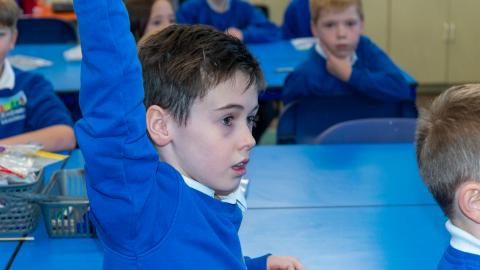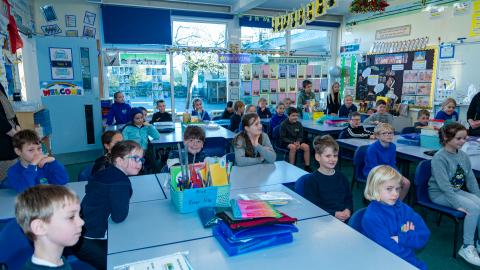|
Maths
Curriculum Intent & Overview
|
|
Key person responsible K Speak
|
|
|
Curriculum Intent:
At Embsay School, we want our children to:
- be curious
- explore ideas
- be able to shine at what they enjoy and do best
- be aware of our locality and the wider world
- care about others
- have experienced a wide range of opportunities
- have the skills and mind-set to be meet the challenges of our changing society
Our curriculum is therefore, planned so that children are involved with their learning, can explore ideas and make links between subject areas.
Opportunities, which will open the children’s eyes to the wider world, are both planned and taken up, when they are offered, to the school.
Given the challenging nature of the world we live in, we also focus on the skills and mind-set that the children will need to succeed, in whatever they do, throughout their lives.
|
|
Curriculum overview
Key points - teaching & planning:
- Maths is taught each day.
- Each class has a Maths board, which is regularly updated to reflect the key learning of the topic being taught.
- White Rose planning is used as a basis for planning, but is adapted and added to, to meet the needs of the cohort
- There is a focus on instant recall of facts to promote fluency and to be focused on at least 3x each week
- Big sheet maths is used in KS2 to develop resilience and problem solving
- SMIRFs and/or times tables are taught regularly within school and are also practised at home
- Online programs are used to support the teaching and learning of Maths throughout schools eg My Maths Online, Times Tables Rockstar, Sumdog, MOTD Active Maths, Timestables.co.uk
- Focus groups are identified and extra support is provided as needed / where staffing / funding allows
|
|
Key points - assessment:
- White Rose’s end of block assessments are used to assess children’s understanding and inform planning
- White Rose’s termly assessments are used to assess children’s attainment and inform teacher’s planning
- Head-start’s end of unit / termly assessments are also available for staff to use if extra assessment material is required in specific areas
- Target tracker is updated each half term and with regard to data points
- Regular practice and assessment of SMIRFs / times tables takes place within school
- Termly assessment data is sent to the subject coordinator for monitoring and progress is monitored / discussed with FP at termly pupil progress meetings
|
|
Key points - resources:
- Practical maths apparatus is kept in classrooms and larger items are stored in Room 7.
- All staff have log-in access to White Rose’s new resources site
- A wide range of resource materials, are available to each year group to compliment and enhance the White Rose Scheme. (eg Head-start, Twinkl, TES, STEM, Primary Resources, …)
- All staff have log-in access to My Maths Online, Times Tables Rock-star & Maths Active, which are used for lessons and with which to set homework tasks.
- Pupils have log-in access to My Maths Online, Times Tables Rock-star and Sum-dog
- Other sites, such as Times-tables.co.uk, are used by pupils to reinforce & consolidate facts
- Pupils are entered for, and are encouraged to take part in, the termly North Yorkshire Sum-dog contests.
|


